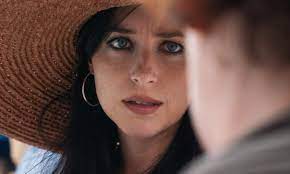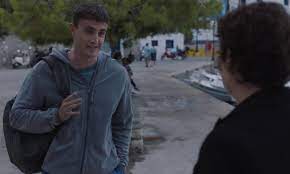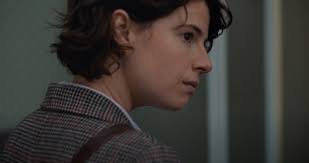Perhaps because I watched it on New Year's Day, I ended Maggie Gyllenhaal's directorial debut The Lost Daughter (Netflix) feeling a bit disappointed that there wasn't more resolution. I was thoroughly enjoying the film and waiting for a big reveal, a major twist, something to happen. But it never really did.
With the best part of a day now to ponder that, I'm starting to see it as one of the film's bonuses. So much in life is left unexplored, swept under the carpet, hinted at, alluded to, or revealed to us in dreams it seems only appropriate that cinema should reflect this - and The Lost Daughter did pretty impressively.
Leda Caruso (Olivia Colman, excellent as usual but that's hardly a surprise) is a middle aged professor who's taking a working holiday (one, it must be said, that doesn't seem to involve any actual work) on an idyllic Greek island where her plan seems to be to sit on the beach, read books, eat ice creams, watch films, and try to avoid getting eaten by insects.
Of course, it's not that easy. She encounters a large group from Queens in New York who wish her to move along the beach so they can spread out to celebrate a birthday. She refuses and the tension this causes is only finally resolved, and even then not conclusively, when Leda finds one of the party's children after she goes missing on the beach.
The mother of the child, Nina (Dakota Johnson), and her sister Callie (Dagmara Dominczyk), strike an uneasy, and awkward, friendship with Leda but Leda is warned by summer worker Will (Paul Mescal) that Callie, Nina, and the ominous men they appear to be in relationships with, are "bad people".
That certainly seems likely but Will himself appears to not have revealed his full hand. Even during a flirty lunch with Leda, a woman twice his age. Leda's getting attention from the other end of the age range too. Taciturn janitor Lyle (played by Ed Harris as a kind of skeletal Beach Boy) seems somewhat smitten by her and, interestingly, she neither closes the door entirely to him nor opens it up.
It remains ajar, allowing in some kind of half-light, and in that it seems to reflect much of what we know, and what we learn, about Leda's life, specifically her own experience of motherhood. Something, it soon becomes apparent, she did not take naturally too.
During regular flashback scenes, we see the young Leda (Jessie Buckley) struggling to bring up her two young daughters Bianca (Robyn Elwell) and Martha (Ellie Blake), we see her haunted by the demons of her own upbringing, we see her begrudge the life she has had taken away from her and the man, her husband Joe (Jack Farthing), she believes, not entirely incorrectly, who refuses to acknowledge how difficult it all is for her.
We see her, too, throw herself into the arms of the pretentious and beardy fellow Yeats translator Hardy (Peter Sarsgaard). When we cut back to the elder Leda she is often staring into space, haunted or transfixed both by her memories and the relationship between Nina and her daughter Elena (Athena Martin). A relationship Leda seems to see, rightly or wrongly, as one that echoes that of her own experience of motherhood.
When Leda presents Nina with a hatpin it seems likely that the rule of Chekhov's gun will be applied but we're never sure in exactly which way and when Elena is distraught following the disappearance of her somewhat spooky, aren't they all?, favourite doll that, too, seems a key to understanding the story of both Leda's past and Nina's present.
But not in quite the way I imagined. To find out what does happen, you'll have to watch yourself and I recommend you do. It's chilling, it's pensive, it's meditative, and it's thoughtful, and if the bomb that seemed to be waiting to explode all through its two hour length never quite did that can only mean it's still ticking.










No comments:
Post a Comment